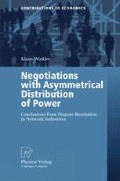Access this chapter
Tax calculation will be finalised at checkout
Purchases are for personal use only
Preview
Unable to display preview. Download preview PDF.
References
Buchanan, 1962, p. 354.
From the various terms for participants in power relations Dahl, 1957, p. 203, chooses the term actor. Cross, 1969, p. 7, discusses more terms. I agree that power is a relation among people, not subjects. The term ‘actor’ describes this best, as actors are actively involved in a negotiation, trying to reach a goal, not playing games. For the thesis I have chosen the term actor as the one that best describes the participants in negotiations. When using the term ‘actors’ in combination with ‘both’ the number of actors is not necessarily exactly two. To make it easier to handle, the terms ‘actors’ and ‘both’ are here to be understood as a representation of several (most often two) actors negotiating. See Hauser, 2002, p. 16, for a similar discussion.
Efficiency is here measured in terms of Pareto optimality and will be discussed in more detail below. See Buchanan, 1966, p. 32.
See Pen, 1952, p. 24, for a discussion that negotiations are only about the price.
See Fisher/ Ury/ Patton, 1991, pp. 97 ff.
See Fant, 1995, p. 177; Huntington, 1996, notes that the differences have diminished only within certain civilizations, i.e. in the so-called western civilization.
Rights and permissions
Copyright information
© 2006 Physica-Verlag Heidelberg
About this chapter
Cite this chapter
(2006). Asymmetrical distribution of power makes negotiations difficult. In: Negotiations with Asymmetrical Distribution of Power. Contributions to Economics. Physica-Verlag HD. https://doi.org/10.1007/3-7908-1744-9_1
Download citation
DOI: https://doi.org/10.1007/3-7908-1744-9_1
Publisher Name: Physica-Verlag HD
Print ISBN: 978-3-7908-1743-0
Online ISBN: 978-3-7908-1744-7
eBook Packages: Business and EconomicsEconomics and Finance (R0)

